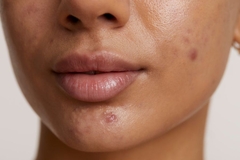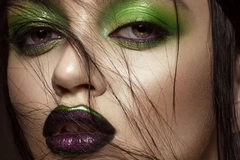Cosmetic Business 2025: Provital showcases Pureblome for aging and adult acne

Provital presented its biotech active Pureblome at the Cosmetic Business 2025 trade fair in Munich, Germany, which ended yesterday. The skin care ingredient addresses adult acne and early signs of aging in women, offering a sustainable, lab-grown alternative to plant harvesting through Triplobiome Technology.
The postbiotic active blends anti-acne and anti-inflammatory benefits with skin-regenerating properties. It is designed to help reduce sebum production, support skin balance, and minimize the signs of skin aging.
Personal Care Insights reported live from the show floor on how Pureblome targets mature skin concerns with a “triple efficacy” approach supported by sustainable development.
“When we launched this ingredient, I was a bit skeptical about whether this was a niche or not. But everyone I’ve talked to so far confirmed that they know somebody who suffers from adult acne. The problem seems to be a lot bigger than people believe,” Hagen Doering, sales manager at Provital, told us.

Adult acne and aging in mind
Pureblome is the second ingredient developed using Provital’s Triplobiome biotechnology platform. The platform harnesses the metabolic activity of endophytic microorganisms — microbes that live within plants — to grow cosmetic actives in a lab.
.jpg) Doering says many women continue to experience acne well into adulthood.“The ingredient reduces sebum production, which is one of the key problems for adult acne,” says Doering. “If you have clogged pores and too much sebum production, it will eventually result in inflammation.”
Doering says many women continue to experience acne well into adulthood.“The ingredient reduces sebum production, which is one of the key problems for adult acne,” says Doering. “If you have clogged pores and too much sebum production, it will eventually result in inflammation.”
In addition to its sebum-regulating effect, the ingredient is standardized in lipopeptides, giving it antimicrobial and anti-inflammatory properties.
“This active ingredient is dedicated to the people who show the first signs of aging and still suffer from adult acne,” Doering explains. According to him, the demand for products targeting both issues is growing as many women experience acne in adulthood.
Medicinal roots for cosmetic application
Triplobiome technology originated in pharmaceutical research when scientists isolated endophytes from tree bark in search of bioactive compounds to treat breast cancer.
The discovery that these microbes could independently produce the targeted compound without the tree led Provital to adapt the method for cosmetics.
“These endophytes, which can be microorganisms or even yeast, started producing the active compound for this medicinal product. We decided that this would be a good platform to use for the production and development of cosmetic ingredients,” says Doering.
As the ingredient is lab-made, the biotechnological route avoids traditional farming inputs, aiding its green profile. “You are not using any big areas to grow the plants. You are not using fertilizers. You are not using pesticides. You need a lot less water for the production. It’s highly sustainable,” he says.
Pureblome is 100% natural, COSMOS-approved, China-compliant, and vegan. It is suitable for various skin care formulations targeting oily, inflamed, and aging skin.
“It can be formulated very easily into any type of skin care routine,” Doering says.
.jpg) Pureblome is designed for women navigating acne and signs of aging.Biotech innovations
Pureblome is designed for women navigating acne and signs of aging.Biotech innovations
As demand grows for biotechnology-based, multifunctional ingredients with strong sustainability profiles, several recent launches highlight how the personal care industry is advancing skin protection and regeneration through science-driven innovation.
Bitop AG’s ectoin, a molecule produced by extremophilic microorganisms, has gained traction for its protective and anti-inflammatory properties. It forms a hydration shell around skin cells, shielding against environmental stressors such as UV radiation, pollution, and blue light while supporting sensitive and aging skin care.
Givaudan Active Beauty also recently launched Evernityl, an anti-aging active derived from upcycled North Atlantic algae. The ingredient is designed to improve skin tone and elasticity and is produced using a solvent-free process that supports marine ecosystem preservation.
Clariant’s Lucas Meyer cosmetics previously introduced Melicica, a scar care active extracted from Australian Manuka honey. The ingredient targets visible scarring, redness, and skin discomfort.













